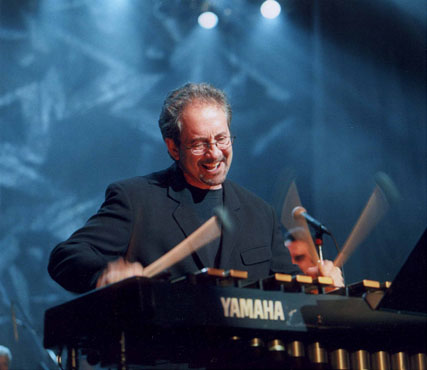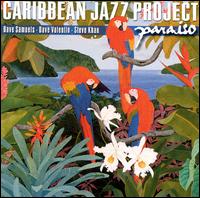
A
FIRESIDE CHAT WITH DAVE SAMUELS OF THE CARIBBEAN JAZZ PROJECT
Are you familiar with the Caribbean Jazz Project? That's what I am here
for. Information is the key. Have you seen Wall Street? Info is the key.
And as GI Joe say, "Knowing is half the battle." So enjoy. You can thank
me later. It's unedited and in his own words.
FRED JUNG: Let's start from the beginning.
DAVE SAMUELS: Well, I started out playing drums. I played drums for twelve
years before I started to play vibes, which was the first of what is considered
the mallet keyboard instruments, also part of the percussion family. After
playing vibes for a while, I got involved with playing marimba, which
is another instrument in that same family. As far as my interest in specifically
Latin music, I have been listening and playing that music for quite a
few years. I would say it became much more concentrated and my interest
became a little bit more expanded when I started the Caribbean Jazz Project,
which started in 1993. It had a different instrumentation than it does
now. We made a couple of records with that group and traveled around and
now this version of the Caribbean Jazz Project is kind of the new, reconstituted
version. It is unusual in the sense that the instrumentation is unusual.
It is a Latin jazz group with no piano, which is unusual. It has a flute,
which is standard to this idiom, vibes, which is a little less standard
and guitar, which is also a little less standard. So it is an unusual
frontline. And the back line, which is bass and two percussionists, is
very unusual. This particular style of music that we are playing is music
that has been fostered and grown in the Caribbean, which is an interesting
area, although most people think of the Caribbean as just being sun and
beach and all that sort of stuff.
FJ: A place for tourists to hangout.
DAVE SAMUELS: A tourist hangout, right. It's very much of a cultural melting
pot of Western Europe and Africa. Western Europe in the sense of all the
colonial powers in that region and West Africa because of all the slave
trade and all the indigenous Indian population, which there is almost
none left. It was a melting pot of those three cultures. The area is the
root of the tree of jazz. It kind of starts in the Caribbean and goes
into New Orleans and up through New Orleans into the rest of the States.
FJ: Influences?
DAVE SAMUELS: I listened to just about every vibes player that I could.
I listened to Milt Jackson and Lionel Hampton and I listened to Terry
Gibbs and I listened to Gary Burton, Bobby Hutcherson, all the vibes players
that were out there at that time. Cal Tjader.
FJ: You did a tribute to Cal Tjader on Verve called Tjaderized.
DAVE SAMUELS: That's right. Cal was a really important figure in terms
of the exposure of what we consider Latin jazz. Here was a guy that had
a similar background to myself. He started out playing drums and eventually
switched from drums to playing vibes and then went out on the road with
George Shearing and he started this band. He started this band with an
unusual instrumentation, not unlike the Caribbean Jazz Project, where
he had not the normal rhythm section, but he had two percussionists, Mongo
Santamaria playing congas and Willie Bobo playing timbales. His impact
for me was not necessarily the instrumentation, but in terms of the kinds
of music that he actually played, of material and his own writing. That
is what was most interesting for me. So when I had the opportunity to
do a tribute to him, I got together a lot of musicians that had played
with him and re-recorded and rearranged a lot of the tunes that he had
recorded. Wrote some new tunes myself and had some other people write
some new tunes. One of them was Chick Corea. He wrote a tune for that
record. Chick had played with Cal many years ago on a record. I found
him to be very influential in terms of his musical orientation.
FJ: Let's talk about your days with Gerry Mulligan.
DAVE SAMUELS: I worked with Gerry Mulligan a long time ago. When I was
growing up and I was listening to music, Gerry was someone that I listened
to. His bands were always interesting. He played an unusual instrument.
He had unusual instrumentations. He wrote some great tunes and set a new
standard for playing baritone saxophone and a new standard for a group
without piano. It was interesting for me because growing up and listening
to him, and then all of the sudden, getting a chance to play with him.
I had an opportunity to spend a lot of time with him traveling, specifically
in Italy. I remember we did quite a few tours where I would go over with
him and we would pick up a local Italian rhythm section, which was excellent,
and we would travel up and down Italy. His wife was from Italy and so
he liked to spend a lot of time there. I loved Italian food and so I liked
to spend a lot of time there. So I got to spend a lot of time with him
and I got to see many other sides, other than just the one musical side
that I knew. He was very well read and very intelligent individual that
had lots of serious interests other than music, but that obviously impacted
him musically.
FJ: There must be a thin line between composing and improvising.
DAVE SAMUELS: Writing is a process. It is not something you start and
stop. It is something that you are interested in pursuing. It is something
that grows with time and changes with time. And for me, being an improviser,
one is always composing because that is what improvisation is. Composition
is like improvisation, but there is a different kind of time framework.
You can go back and change notes, rethink ideas. Whereas with improvisation,
it is spontaneous composition, where you can't go back and change anything.
For me they go hand in hand. One feeds the other. I am always involved
in writing and I am always involved in composing.
FJ: How has your composing hand gotten stronger?
DAVE SAMUELS: I just think that I have gotten a much better vocabulary,
just like being a writer, I think I have been able to conceptualize ideas
and be able to realize them because I have a better musical vocabulary
to be able to express those ideas.
FJ: Your thoughts on the new album on Concord, New Horizons.
DAVE SAMUELS: Like I said earlier, this is a really unique instrumentation.
There is no other combination of instruments like this on the planet,
nor am I aware of a recording with this kind of instrumentation. All the
players in the group come to this musical project with their own personal
musical histories. Everybody has a different background and has different
musical experiences. I think what this record represents is the concentric
areas where we overlap. We have a common language. The individual players
on the recording, you have got Dave Valentin, who has an incredible history
of his own in terms of being a leader and having fifteen, twenty records
out under his own name, as well as having played with all the great Latin
stars. You have Steve Khan, who is a mainstay in the fusion of the Seventies
and had a whole bunch of records out under his own name and has kind of
come to Latin music in the last ten or twelve years really forging a whole
new ground playing electric guitar in this kind of context. You have got
John Benitez, who is a young player who worked with Danilo Perez and David
Sanchez and Eddie Palmieri. You have got Richie Flores, who has worked
with those same players and is considered to be the young, virtuoso conguero.
You have got Robert Vilera from Venezuela and has played in lots of salsa
bands. So you have a really varied background from everyone. I think that
for those people that are not used to listening to instrumental music,
I think one of the interesting aspects of non-vocal music, of non-lyric
music is that it gives the listener an opportunity to use his or her imagination
in terms of letting the music conjure up images for them. For me, it is
much more theater of the mind than being much more lyric driven where
you listen to the lyric and the lyric kind of tells you what the music
is supposedly about.
FJ: What images do this recording conjure?
DAVE SAMUELS: Wow (laughing), I don't know that there is any one particular
image. I would say that there are images for every one of the tunes in
terms of how I perceive them. It is different being on the inside looking
out than on the outside looking in. Being involved in the actual process
of making music is a very different experience than being on the outside
and being effected by that process.
FJ: Tour dates?
DAVE SAMUELS: We're going to be in New York City tonight. We have dates
in Philadelphia. We're then going to Europe, where we are going to be
in Italy and Germany for a couple of weeks. We have another European tour
in July for a month. We have a date out in Seattle in May, a date in Los
Angeles at the end of May.
FJ: What venue in LA?
DAVE SAMUELS: It will be at Catalina's. We are going to be out there playing
and letting people experience what this music is like.
Fred Jung is Editor-In-Chief and says 7-up yours. Comments? Email
him.

